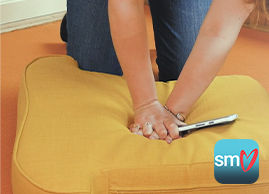
“I need to hire you,” the 30-something taxi driver said to me on the way to the airport. I had just wrapped up speaking at a fitness event and was on my way to the airport home. The taxi driver mentioned that he wanted to lose a little weight. He said he plays soccer three times a week and does a popular infomercial workout that consists of high-intensity intervals for 25 minutes most days of the week. He also mentioned some transient knee pain that seems to come and go.
While the popularity of high-intensity interval training has been wonderful for our ability to get results from our fitness programs, it has also brought with it an increase in the prevalence of overtraining.
The cab driver’s situation is a common one: over-exercising while “under-moving” (yes, I’ll explain), under-recovering and over-thinking. (Not to mention too many meals coming his way through drive-in windows.)
We’ve become a society of intense exercisers and committed sitters. We hit it hard, and then sit too long. And to make things worse, we rarely give our minds a rest from constant stimulation.
Overtraining leaves you feeling unmotivated and moody, compromises performance (both in and out of the gym), and promotes an array of potential injuries. It also has a potentially negative effect on many bodily systems, including appetite, sleep and menstruation.
Over-exercise and Under-movement

The over-exercise part is fairly simple. In the case of the cab driver, he’s doing way too much high-intensity activity. Playing soccer three times a week for two hours (a high-intensity sport) means he should include no more than one high-intensity workout during the rest of his week. In general, whatever form it takes, your body will successfully tolerate just two to three high-intensity workouts per week.
This is all you need to remember: You progress when you recover—not when you work out. The workout is the stimulus for change, but the recovery is the change.
Now for that “under-movement” thing.
We dutifully schedule our workouts. Check. Then we sit in our cars to and from work. We sit at our desks at work and then sit on our couches to recover from the stresses of the day while watching TV and surfing the web. We don’t move enough outside of physical activity. Our bodies thrive on regular movement (not exercise), however, because this equals more blood flow and this equals recovery.
Movement => Circulation => Nutrients and Removal of Waste Products => Better Yougett
It’s simple. Move more outside of exercise. The movement need only meet one criteria: That it is not challenging enough to be called exercise. Exercise is breakdown of tissue—it is a challenge. Movement is simply movement. Do a little more of it however it suits you. Make it playful, make it enjoyable, and look forward to it by choosing a method of movement that interests you.
Over-thinking: Give it a Rest Already
We don’t let our minds rest. We buzz through a jam-packed day in a blur of activity. We don’t sleep enough, and the sleep we do get is often poor quality because our minds are continually churning on 10 things at once. A recent television commercial quipped, “You Americans multi-task so much it should be called ‘regular tasking.’”
Have you noticed how whenever you are stressed, your breathing is fast and shallow? (You probably haven’t—who has time to pay attention to their breathing?) And the converse is true. When you are calm, relaxed, centered and have the right amount of focus, your breathing is slow and deep.
If you have a hard time getting your mind to be quiet, use the power of breath. Stand or sit— preferably in nature or with a view of nature—and slow and deepen your breathing. Just like stress creates fast, short breaths, we can use the breath to create a positive, healthful mind shift. It’s a two-way street. I’m not talking about completely emptying your mind. Rather, I am suggesting you step out of the frenzy, towel off and take a break from swimming in the raging river of your to-do list. Take five minutes and do this. Don’t have five minutes? Fine, try four. Just try it.
Breathing expert Ed Harrold recommends lengthening your exhale and employing nasal-breathing (inhale and exhale exclusively through the nose.) Slowing your exhale enhances production of brain chemicals that enhance the feeling of “flow” and also enhances your energy production from fat.
Go to Sleep!

I know, I know—you’re tired of hearing it. The average adult needs between seven and nine hours of sleep each night. There are outliers to be sure—people who need 5 or 10 hours of sleep to function optimally. Who cares? You need to listen to what your body tells you it needs. Our bodies are really smart, but too often we ignore its wisdom and compare ourselves to others when our biology and our genes couldn’t care less what another person does.
If you’re feeling sluggish all day and the need to inject espresso shots directly into your bloodstream to get through workouts and your work day, it’s probably time to get more sleep. Instead of rolling your eyes, close them.
Feeling well rested is like a legal performance-enhancing drug. If you’re sleep-deprived, getting a few nights of adequate sleep will most likely have you feeling like you took something that feels so good it should be illegal.
We can’t be everything to everyone all the time, crush killer workouts, frantically fly through our to-do list, sleep five hours a night, eat junk on the run and have any kind of life.
Get Your Mind Right

Too many people I talk to put themselves through grueling workouts to work off the (insert dessert/alcohol/junk food here) they consumed the night before. No, no, no, no, no. Please stop. This will never work. First, this mindset sets up exercise as a punishment for eating mistakes and this will result in a negative feeling toward exercise. It’s like getting sent to your room or having to sit in a corner for screwing up. And even worse, you’re crushing hard workouts and rebuilding your body from junk. Your joints, muscles, bones, hair, skin and fingernails are all made from junk. And yet you want them to be great for you. Not gonna happen.
Wrap-up
When used as part of an overall sound approach to health, hard workouts will feel great. You’ll enjoy the feeling of challenging yourself instead of feeling like you’re punishing yourself.
Relieve yourself of the pressure to keep punishing your body with more and more hard exercise. Work hard. Recover. Repeat. It will make your up time more up, and your down time more down.
Further Reading:
For a deeper exploration of breath techniques to enhance recovery, see Ed Harrold’s article “3 Strategies for Improving Recovery”




 by
by 








 by
by